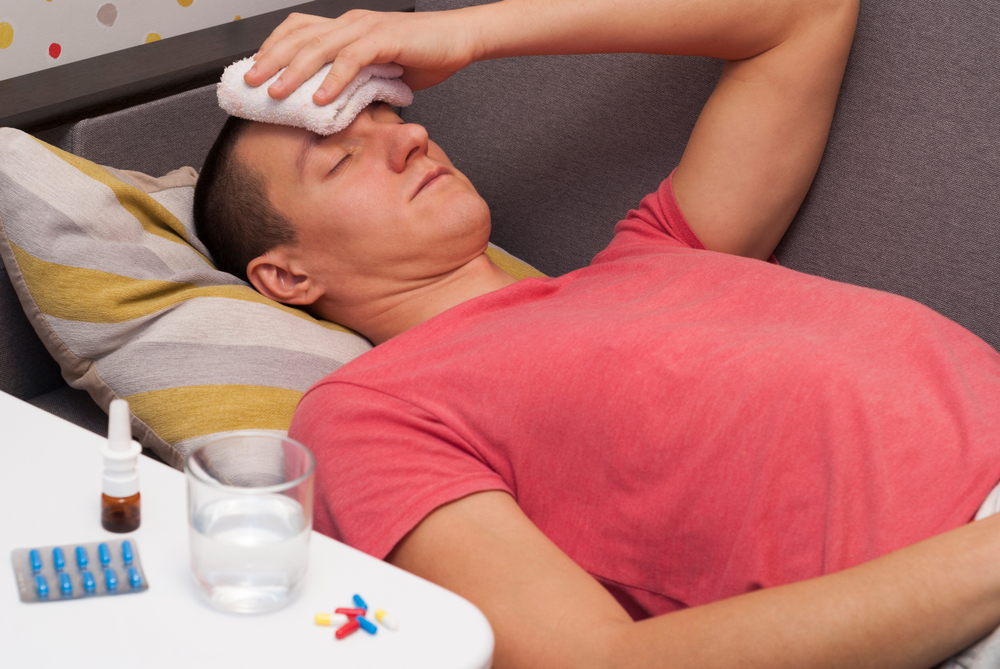Do It Yourself
Basic Medical Symptom Care: How to Handle Common Illnesses

When push comes to shove, you must be knowledgeable in how to practice basic medical symptom care. During these uncertain times, you have to be as prepared as possible.
Basic Medical Symptom Care Guide
As you hone in on the skills and knowledge that you’re likely to need in a SHTF situation, it can be overwhelming to think about everything you should be able to do on your own: gardening, fishing, raising livestock, building shelters, hunting for food, preserving food, tying knots, navigation, self-protection, repairing machinery – and not least of all, basic medical care.
Even in highly likely and common natural disaster situations like hurricanes and earthquakes, you may find yourself cut off from electricity and access to doctors.
While you may not be equipped to deal with more serious conditions like heart attacks or strokes, you should be able to dress minor wounds and help ease discomforts like fevers, vomiting, diarrhea, stomach cramping, and dehydration.
Being able to treat these symptoms and bring relief to yourself or family members can make you less reliant on outside help that may be a long time coming.
In addition to food, water, tools, and fuel supplies, it’s important to keep a comprehensive first aid kit on hand that includes over-the-counter remedies and any necessary prescription medications.
Your health is one of your greatest assets, and preserving it will make you better able to care for and protect your family. Both maintaining your health and knowing how to handle more minor health crises is an important part of your Prepping.
How to Break a Fever

A fever is your body’s natural response to fighting an infection, virus, or bacteria. Any temperature over 100.4 degrees is considered a fever, although accompanying symptoms will vary.
While a fever can be mild with few other symptoms, it can also be an indication of a much more serious condition. Either way, the steps to help break the fever are:
- Get an accurate reading of your temperature to determine how high the fever is.
- Stay in bed and rest; don’t overexert yourself.
- Stay hydrated! Drink lots of water or suck on ice chips.
- Take acetaminophen or ibuprofen.
- Stay cool, but avoid ice baths.
- Use cold compresses to help you feel more comfortable.
Some fevers will require medical attention. However, if you do not have access to a doctor, continue with these steps.
Remedies for Vomiting

Vomiting is an incredibly uncomfortable way to remove toxins from your body and can leave you exhausted and dehydrated. Long-term vomiting can even damage your esophagus.
Luckily, there are some home remedies that may help:
- Consume ginger: ginger tea, ginger juice, slices of fresh ginger, or candied ginger.
- Turn to peppermint: peppermint tea, peppermint essential oil in your diffuser, or chew on mint leaves.
- Practice deep breathing techniques to soothe your mind and body.
- Acupressure: research points out that you can apply pressure to for relief from nausea and vomiting.
- Consume fennel seeds: eat raw fennel seeds or drink fennel tea.
- Avoid solid foods and increase your fluid intake.
- Add small portions of bland, low-fat foods back into your diet when you are able to.
You can help to avoid bouts of vomiting by washing your hands frequently and being careful not to consume raw or undercooked or spoiled foods. If someone close to you is experiencing vomiting, keep your distance from them if you can. Keep your stress levels low.
Treating Diarrhea
View this post on Instagram
Bouts of diarrhea typically only last for a couple of days but can be extremely uncomfortable and inconvenient. Imodium is an effective over-the-counter remedy but can quickly lead to constipation. To limit your dependence on medication, try these tips first:
- Drink plenty of water and clear broths to rehydrate yourself.
- Avoid caffeinated drinks, sugary drinks, alcohol, and dairy products.
- Eat a bland and easy-to-digest diet, such as bananas, rice, applesauce, toast, oatmeal, baked potatoes, and crackers.
- Take probiotics that are beneficial to your digestive system.
It is extremely important that you stay hydrated when you are suffering diarrhea or you will undoubtedly require medical attention after a few days.
Stomach Cramp Treatments

Most stomach cramps are caused by food poisoning, stomach viruses, food allergies, and food intolerances, and are accompanied by other symptoms. While you may find yourself treating accompanying diarrhea or vomiting, stomach cramps themselves can be improved by:
- Resting in bed
- Avoiding foods that did or could have made you sick.
- Avoid solid foods and instead, consume plenty of liquids and clear broths.
- Ease into eating with bland foods, and stop eating if discomfort continues.
- Avoid all foods that you have an allergic reaction to.
- Take an over-the-counter antacid if you experience stomach aches or heartburn.
Treatment for Dehydration
View this post on Instagram
Dehydration can occur for a variety of reasons and can be severe or milder. No matter the situation, it’s imperative that you rehydrate so that your body can function as it is supposed to.
As dehydration progresses, it can lead to severe headaches, hallucinations, and eventually seizures and death.
For mild cases of dehydration, you will want to stay in a cool place and drink plenty of water. Avoid coffee, tea, soda, and alcohol, which will all dehydrate you more.
You will also want to replenish your electrolytes using a sports drink or even a mixture of salt, sugar, and water. Children rehydration drinks like Pedialyte are also effective.
Severe dehydration can require an IV. It’s best to plan ahead and keep plenty of fluids on-hand, especially if you are at an increased risk for dehydration.
Make basic medical care a priority as you prep for the worst. You’ll never know what’s to come and the best way to deal with uncertainty is preparation!
How about you, how do you practice basic medical symptom care at home? We’d love to hear some tips for you in the comments section!
Up Next:
-

 Do It Yourself7 months ago
Do It Yourself7 months agoParacord Projects | 36 Cool Paracord Ideas For Your Paracord Survival Projects
-

 Do It Yourself9 months ago
Do It Yourself9 months agoHow To Make Paracord Survival Bracelets | DIY Survival Prepping
-

 Do It Yourself9 months ago
Do It Yourself9 months ago21 Home Remedies For Toothache Pain Relief
-

 Do It Yourself10 months ago
Do It Yourself10 months agoSurvival DIY: How To Melt Aluminum Cans For Casting
-

 Exports8 months ago
Exports8 months agoAre Switchblades Legal? Knife Laws By State








Pingback: Shock – When There Is No Doctor - Cooking in Quarantine